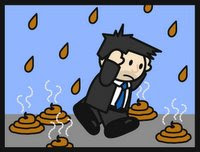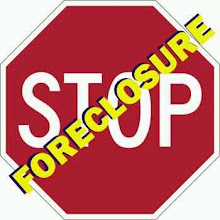As top Federal Reserve officials debated whether there was a housing bubble and what to do about it, then-Chairman Alan Greenspan argued that the dissent should be kept secret so that the Fed wouldn't lose control of the debate to people less well-informed than themselves.
"We run the risk, by laying out the pros and cons of a particular argument, of inducing people to join in on the debate, and in this regard it is possible to lose control of a process that only we fully understand," Greenspan said, according to the transcripts of a March 2004 meeting.
At the same meeting, a Federal Reserve bank president from Atlanta, Jack Guynn, warned that "a number of folks are expressing growing concern about potential overbuilding and worrisome speculation in the real estate markets, especially in Florida. Entire condo projects and upscale residential lots are being pre-sold before any construction, with buyers freely admitting that they have no intention of occupying the units or building on the land but rather are counting on 'flipping' the properties--selling them quickly at higher prices."
Had Guynn's warning been heeded and the housing market cooled, the financial collapse of 2008 could have been avoided. But his comment was kept secret until Friday, when the central bank released the transcripts of Federal Open Market Committee meetings for 2004 and CalculatedRisk spotted it. The transcripts for 2005 to the present are still secret.
"The substantial run-up in house prices, which we have followed in Florida and also see in the populous Northeast and West Coast of the United States, may be at least partially attributable to unusually low mortgage rates influenced by our very accommodative policy," Guynn warned.
But when the Fed released contemporaneous minutes of the meeting, the bank downplayed Guynn's concerns.
"Reports from some contacts suggested that speculative forces might be boosting housing demand in some parts of the country, with concomitant effects on prices, suggesting the possibility that house prices might be moving into the high end of the range that could be consistent with fundamentals," reads the minutes, which were released to the public several weeks after the meeting.
Story continues below
Note the qualifiers "might be," "suggesting the possibility," "might be," "could be." In the real world that Guynn described there is nothing whatsoever "consistent with fundamentals" that could explain "buyers freely admitting that they have no intention of occupying the units or building on the land but rather are counting on 'flipping' the properties."
The release of the transcripts comes at a bad time politically for the Federal Reserve, as it works to prevent Congress from authorizing the Government Accountability Office to audit the central bank.
The audit language has already passed the House, despite White House and Fed opposition, and a Senate amendment by Bernie Sanders (I-Vt.) is gaining momentum, cosponsored as of Monday morning by ten Republicans and five Democrats.
But the Fed also benefits from the timing. "Transcripts of meetings for an entire year are released to the public with a five-year lag," according the Fed's own policy. Had the transcripts been released on time, they could have influenced the confirmation of Ben Bernanke for a second term as chairman. Meanwhile, the Fed policy of releasing a full year at once deprives the public of transcripts from the first four months of 2005, which are now five years old. A Fed spokeswoman tells HuffPost those transcripts will be available at roughly this time next year.
At the same March meeting, Bernanke said that he had reviewed the transparency policies of foreign central banks and found that other banks were more forthcoming. "It seems to me that we might want to consider the possibility of providing the public with some type of regular financial stability report, perhaps as part of the Monetary Policy Report to the Congress or in some other existing venue or perhaps as a stand-alone document," Bernanke suggested. More than five years later, with Bernanke now chairman, that report has yet to be made public, though the Fed did create an inter-divisional internal working group on financial stability.
Other than the passing mention of speculation, the March minutes imply that the meeting participants had a rosy outlook on the housing bubble. "Activity in the housing market moderated in January and February from its elevated pace in the fourth quarter. Single-family housing starts and permits stepped down, although both measures remained above their average levels of the first three quarters of 2003," the minutes read. "Overall, expenditures were supported by sizable gains in real disposable personal income and increases in household wealth owing to rising home and equity prices. ... Committee members noted that activity in the housing sector, while still quite elevated, had fallen back from its extraordinary pace of late last year."
But there were indications from others that housing prices were getting out of hand. "A second concern is that policy accommodation -- and the expectation that it will persist -- is distorting asset prices. Most of this distortion is deliberate and a desirable effect of the stance of policy," said Federal Reserve Board Vice Chairman Don Kohn, meaning that low interest rates were artificially propping up housing prices. "But as members of the Committee have been pointing out, it's hard to escape the suspicion that at least around the margin some prices and price relationships have gone beyond an economically justified response to easy policy. House prices fall into this category."
The suspicion that Kohn says is hard to escape doesn't appear in the minutes; rather, it only appears in the transcripts that were released on Friday. While the House debated a measure to authorize an audit of the Fed, Kohn personally lobbied against it. He has since announced his resignation.
The president of the Federal Reserve Bank of Boston, Cathy Minehan, also voiced concerns. "New England's rate of inflation, as measured by the Boston CPI, is rising much faster than the nation's, largely because of a 6.3 percent increase in shelter costs versus a year ago. The high price of housing worries many in the region who find that hiring the skilled workers they need in health care, for example, is made even more difficult by high housing costs," she said. While conceding that raising interest rates could come with its own risks, she argued: "I think the costs to us in terms of credibility would be greater if the situation got out of hand on the upside."
Even Tim Geithner, then president of the New York Fed, raised concerns. "[T]he issue has been raised by [Federal Open Market Committee] Vice Chairman Geithner and others that our current policy stance may contribute to potential financial imbalances down the road," then-Vice Chairman Ben Bernanke said, according to the transcript, before dismissing such concerns. ("Imbalance," of course, is a gentle term to describe what the housing crash ultimately wrought.)
Three months later, participants at the June meeting were still concerned. Stephen Oliner, the Fed's associate research director, showed the committee a chart of the growing disparity between home and rent prices, the most obvious indication of a housing bubble. Roger Ferguson, a Fed vice chairman, asked about a footnote in the chart that said the graph had been adjusted to reflect biases in the trends, according to the transcript. Oliner described the adjustments as "technical."
"Had we not adjusted for them, the rent-to-price ratio would have been much lower at the end point. So it would have looked more alarming," he said. Oliner also flipped the housing line upside down so that it's not shooting off into the sky and is instead descending. "I don't want to leave the impression that we think there's a huge housing bubble. We believe a lot of the rise in house prices is rooted in fundamentals. But even after you account for the fundamentals, there's a part of the increase that is hard to explain," said Oliner.
Jeff Lacker, president of the Richmond Federal Reserve Bank, was also curious about the chart. "Just to follow up on what Roger was asking about the panel in chart three on housing valuations. In that panel the relative movement of the two measures is somewhat key to at least the intuitive persuasiveness of the argument that housing might be overvalued," said Lacker. A laugh was then had by Greenspan and the other committee members about the confusing chart.
"You can't trust them to do it right!" Greenspan cracked, according to the transcript. No reference to the chart appears in the June minutes.
Instead, the minutes reflect Greenspan and Bernanke's position that the rise in housing prices was nothing to worry about. Here's what the Fed's minutes told the public: "In housing markets, activity had remained at generally high levels, with only a few signs that rising mortgage rates were beginning to hold down sales and construction. There was evidence in some areas that inventories of unsold homes had risen. Members noted that persisting overall strength in housing might to some extent be a response to expectations of further increases in mortgage rates, implying that a slowdown might be likely later in the year."
http://www.huffingtonpost.com/2010/05/03/greenspan-wanted-housing_n_560965.html 












